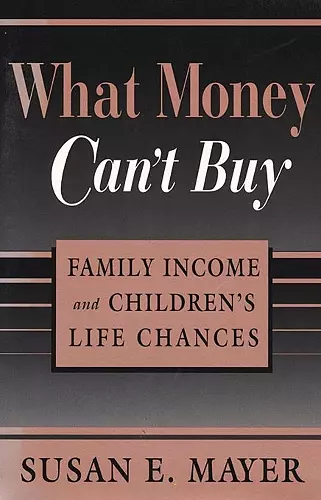What Money Can’t Buy
Family Income and Children’s Life Chances
Format:Paperback
Publisher:Harvard University Press
Published:15th Oct '98
Currently unavailable, and unfortunately no date known when it will be back

Children from poor families generally do a lot worse than children from affluent families. They are more likely to develop behavior problems, to score lower on standardized tests, and to become adults in need of public assistance.
Susan Mayer asks whether income directly affects children's life chances, as many experts believe, or if the factors that cause parents to have low incomes also impede their children's life chances. She explores the question of causation with remarkable ingenuity. First, she compares the value of income from different sources to determine, for instance, if a dollar from welfare is as valuable as a dollar from wages. She then investigates whether parents' income after an event, such as teenage childbearing, can predict that event. If it can, this suggests that income is a proxy for unmeasured characteristics that affect both income and the event. Next she compares children living in states that pay high welfare benefits with children living in states with low benefits. Finally, she examines whether national income trends have the expected impact on children. Regardless of the research technique, the author finds that the effect of income on children's outcomes is smaller than many experts have thought.
Mayer then shows that the things families purchase as their income increases, such as cars and restaurant meals, seldom help children succeed. On the other hand, many of the things that do benefit children, such as books and educational outings, cost so little that their consumption depends on taste rather than income. Money alone, Mayer concludes, does not buy either the material or the psychological well-being that children require to succeed.
Everyone involved in 'welfare reform' could usefully read What Money Can't Buy, a study by economist Susan Mayer of the University of Chicago. Its message is somber: as a society, we are fairly helpless to correct the worst problems of child poverty. This is not a new insight, but by confirming it, Mayer discredits much of the welfare debate's overwrought rhetoric. `Welfare reform' may raise or lower poverty a bit (we can't say which), but neither its supposed virtues nor its alleged vices are powerful enough to alter the status quo dramatically. What's impressive about Mayer's study is that it contradicts both her politics and her history...[and] demolishes much of the welfare debate's rhetorical boilerplate, liberal and conservative. -- Robert J. Samuelson * Newsweek *
Mayer's findings make a useful--and sometimes surprising--contribution to the long and painful debate over welfare reform and its iffy implementation...More money does help the children of poor families, Mayer concedes. But the effect is considerably less--and more complicated--than is generally thought, even among social scientists, her research shows...The results of her extensive research--appendices, references, and notes make up almost one third of the book--show that 'once children's basic material needs are met, characteristics of their parents become more important to how they turn out than anything additional money can buy. -- Joan Beck * Chicago Tribune *
[Mayer] explores a social-science conundrum that has been near the center of the technical policy debate for 30-odd years...Some of her [social science] innovations are important contributions to the art...[Her] analysis indicates that more income transfers are not going to do much about the life chances of the children whose current life chances she properly deplores. The details of her findings will be argued by policy analysts of all stripes...[but] to transgress those [political] boundaries has required an independence of spirit...[and] Mayer has made it a bit easier for more young scholars to question the orthodoxy. -- Charles Murray * Washington Times *
[In What Money Can't Buy, Susan Mayer] developed a statistical model that predicted what would happen to children's prospects if poor families' incomes were increased from $15,000 to $30,000 a year. The surprising answer is: not much. Ms Mayer found that although doubling the income of poor families would lift most children above the poverty line, it would have virtually no effect on their test scores and only a slight effect on social behaviour...There are two reasons for this. First, Ms Mayer notes that the extra money tends to be spent on such things as restaurant meals, clothes, dishwashers, roomier houses or second cars, none of which matters much in helping children succeed in school or life...Second, good parenting has much in common with being a good worker. In both roles, the reward goes to diligence, determination, good health, willingness to co-operate, and so on. Children with parents who possess these qualities tend to do well in life, even if mother and father do not make much money. * Economist *
A major accomplishment that merits and will almost certainly receive the attention of social scientists, policymakers, and the general public. Mayer has identified a central policy issue and examined it carefully and without flinching from many angles. It is not likely to be the last word on the relationship between family income and children's outcomes...Like most important books, it will redefine the terms of the debate about the effects of family income on child outcomes. Whether one agrees with its conclusions or not, they cannot be ignored. -- Saul D. Hoffman * Contemporary Sociology *
This well-argued book will surely become fodder in political debates concerning welfare programs. * Library Journal *
ISBN: 9780674587342
Dimensions: unknown
Weight: 318g
256 pages